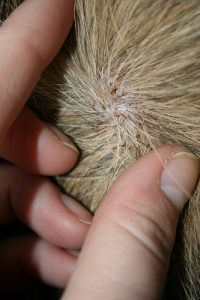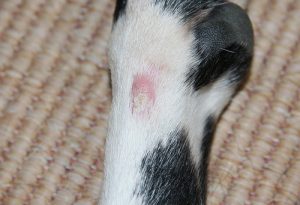Doggie Skin Issues
If your dog is having skin problems, narrowing down which skin disorder it is and its cause can be a real task. Even for your vet. That’s because there are over 160 different skin disorders that affect canines. Dog skin disorders are among the most common health problems in dogs and some of the most troublesome for the unfortunate pup with the problem.
Our blog post today touches on some of the most common skin problems that cause discomfort in dogs.
 Fleas
Fleas
Fleas are the most common, and most obvious cause of skin problems in dogs. Some dogs are much more sensitive to the bites than others. Some dogs even develop an allergy to a substance in the flea saliva and even one bite is enough to cause tremendous discomfort.
Allergic Dermatitis
Just like in humans, dogs can be allergic to just about anything, and that allergy expressed in skin problems such as itchiness, flaking, and inflamed skin. The problem is narrowing down the allergen causing the problems, and limiting exposure. Your dog’s veterinarian can help in managing symptoms.
Yeast Infections
If your dog is constantly scratching its ears or licking at a certain area, a yeast infection might be the culprit. Yeast infections need warm moist places to grow and are commonly found in the ears and between the toes.
Folliculitis
If your dog has folliculitis, you might notice small sores, scabs, and little red bumps on the skin. This problem is most commonly found in conjunction with other skin disorders, such as mange or allergies.
Seborrhea
Oily fur and flaking skin is no joke for pups with seborrhea. This skin disorder can signal other underlying health issues, such as hormonal imbalances or allergies.
 Skin problems are common, not always obvious. If your dog is constantly scratching or licking its skin, you’ll probably notice, but more subtle signs are easy to miss. Just one more good reason to take your dog in for regular annual checkups. And if you see a professional groomer regularly, that’s like having an extra set of eyes on your pet. Groomers often notice things that pet owners don’t, and are trained to alert you to any unusual skin problems.
Skin problems are common, not always obvious. If your dog is constantly scratching or licking its skin, you’ll probably notice, but more subtle signs are easy to miss. Just one more good reason to take your dog in for regular annual checkups. And if you see a professional groomer regularly, that’s like having an extra set of eyes on your pet. Groomers often notice things that pet owners don’t, and are trained to alert you to any unusual skin problems.
